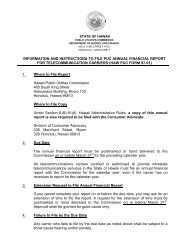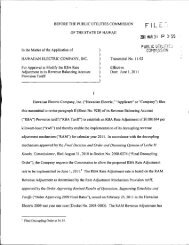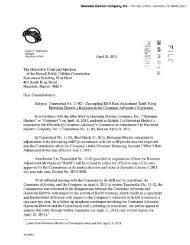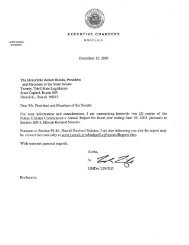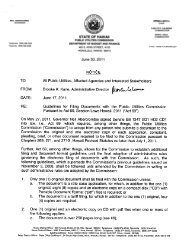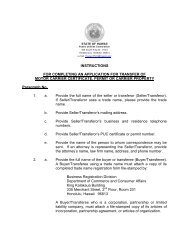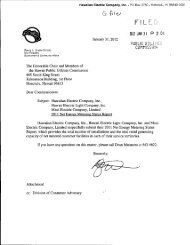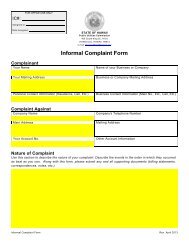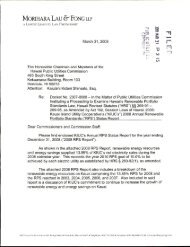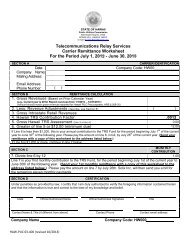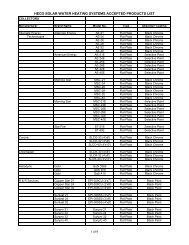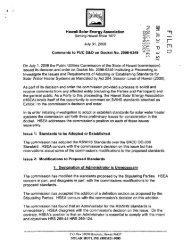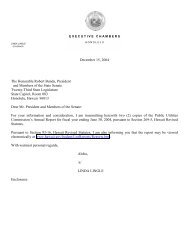PUC Annual ReportâFiscal Year 2011-12 - Public Utilities Commission
PUC Annual ReportâFiscal Year 2011-12 - Public Utilities Commission
PUC Annual ReportâFiscal Year 2011-12 - Public Utilities Commission
You also want an ePaper? Increase the reach of your titles
YUMPU automatically turns print PDFs into web optimized ePapers that Google loves.
<strong>Public</strong> <strong>Utilities</strong> <strong>Commission</strong> <strong>Annual</strong> Report <strong>2011</strong>-<strong>12</strong><br />
State of Hawaii Page 51<br />
Enforcement Activities<br />
The <strong>Commission</strong> enforces its rules and regulations, standards, and tariffs by<br />
monitoring the operating practices and financial transactions of the regulated utilities<br />
and transportation carriers. Enforcement activities involve customer complaint<br />
resolution, compliance with financial reporting and other requirements, and motor carrier<br />
citations. These enforcement activities are critical in ensuring that customers of the<br />
regulated companies receive adequate and efficient services.<br />
Complaint Resolution<br />
The <strong>Commission</strong>’s role in protecting the public is carried out in part through its<br />
investigation and resolution of complaints. The <strong>Commission</strong> collects and compiles utility<br />
and consumer complaints to track trends and patterns in the utility and transportation<br />
industries. The <strong>Commission</strong> accepts verbal and written complaints against any public<br />
utility, water carrier, motor carrier, or others subject to the <strong>Commission</strong>’s jurisdiction.<br />
Verbal complaints are received by telephone, or in person at the <strong>Commission</strong>’s office.<br />
There are two kinds of written complaints—formal and informal.<br />
The <strong>Commission</strong>’s rules of practice and procedure, Chapter 6-61, HAR, provide<br />
the requirements for formal and informal written complaints. Written formal complaints<br />
should: (1) be in writing; (2) comply with filing and other requirements set forth in<br />
Sections 6-61-15 to 6-61-21, HAR; (3) state the full name and address of each<br />
complainant and of each respondent; (4) set forth fully and clearly the specific act<br />
complained of; and (5) advise the respondent and the <strong>Commission</strong> completely of the<br />
facts constituting the grounds of the complaint, the injury complained of, and the exact<br />
relief desired. If the <strong>Commission</strong> accepts a formal complaint for adjudication, it assigns<br />
a docket number and sets the matter for an evidentiary hearing, if necessary.<br />
Written informal complaints should: (1) state the name of the respondent, the<br />
date and approximate time of the alleged act, and set forth fully and clearly the facts of<br />
the act complained of; (2) advise the respondent and the <strong>Commission</strong> in what respects<br />
the provisions of the law or rules have been or are being violated or will be violated and<br />
should provide the facts claimed to constitute the violation; and (3) specify the relief<br />
sought or desired. The <strong>Commission</strong> assigns a tracking number to each written informal<br />
complaint filed with the <strong>Commission</strong> and also assigns these complaints to certain<br />
<strong>Commission</strong> staff, who are tasked to, among other things, investigate and attempt to<br />
resolve the complaints through correspondence or conference rather than through the<br />
formal complaint process.<br />
Formal Complaints<br />
There was one formal complaint processed in FY 20<strong>12</strong>.<br />
Docket No. 20<strong>12</strong>-0159.<br />
The complaint is



